人教版高中英语必修4Unit1__语言点参考教案
- 格式:doc
- 大小:44.50 KB
- 文档页数:10
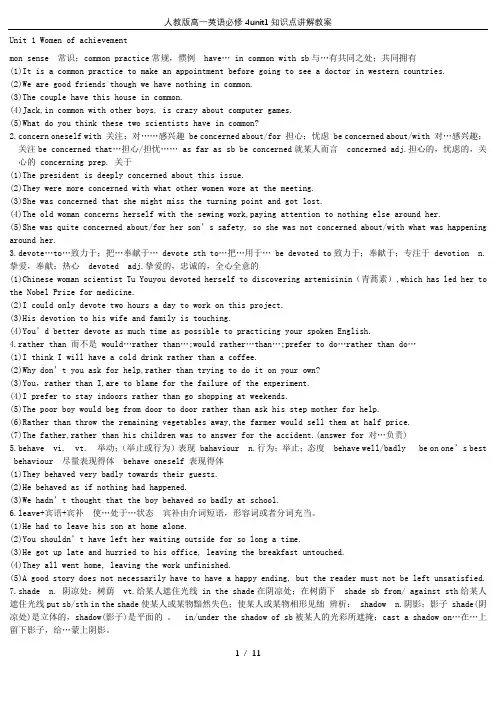
Unit 1 Women of achievementmon sense 常识;common practice常规,惯例have… in common with sb与…有共同之处;共同拥有(1)It is a common practice to make an appointment before going to see a doctor in western countries.(2)We are good friends though we have nothing in common.(3)The couple have this house in common.(4)Jack,in common with other boys, is crazy about computer games.(5)What do you think these two scientists have in common?2.concern oneself with 关注;对……感兴趣 be concerned about/for 担心;忧虑 be concerned about/with 对…感兴趣;关注be concerned that…担心/担忧…… as far as sb be concerned就某人而言 concerned adj.担心的,忧虑的,关心的 concerning prep. 关于(1)The president is deeply concerned about this issue.(2)They were more concerned with what other women wore at the meeting.(3)She was concerned that she might miss the turning point and got lost.(4)The old woman concerns herself with the sewing work,paying attention to nothing else around her.(5)She was quite concerned about/for her son’s safety, so she was not concerned about/with what was happening around her.3.devote…to…致力于;把…奉献于… devote sth to…把…用于… be devoted to致力于;奉献于;专注于 devotion n.挚爱,奉献;热心 devoted adj.挚爱的,忠诚的,全心全意的(1)Chinese woman scientist Tu Youyou devoted herself to discovering artemisinin(青蒿素),which has led her to the Nobel Prize for medicine.(2)I could only devote two hours a day to work on this project.(3)His devotion to his wife and family is touching.(4)You’d better devote as much time as possible to practicing your spoken English.4.rather than 而不是would…rather than…;would rather…than…;prefer to do…rather than do…(1)I think I will have a cold drink rather than a coffee.(2)Why don’t you ask for help,rather than trying to do it on your own?(3)You,rather than I,are to blame for the failure of the experiment.(4)I prefer to stay indoors rather than go shopping at weekends.(5)The poor boy would beg from door to door rather than ask his step mother for help.(6)Rather than throw the remaining vegetables away,the farmer would sell them at half price.(7)The father,rather than his children was to answer for the accident.(answer for 对…负责)5.behave vi. vt. 举动;(举止或行为)表现 bahaviour n.行为;举止;态度behave well/badly be on one’s best behaviour 尽量表现得体 behave oneself 表现得体(1)They behaved very badly towards their guests.(2)He behaved as if nothing had happened.(3)We hadn’t thought that the boy behaved so badly at school.6.leave+宾语+宾补使…处于…状态宾补由介词短语,形容词或者分词充当。
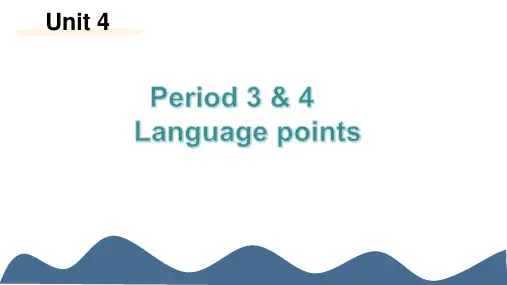
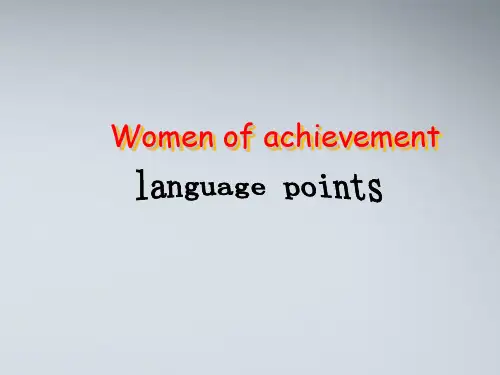
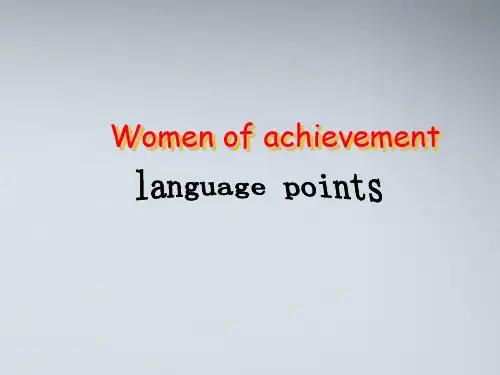
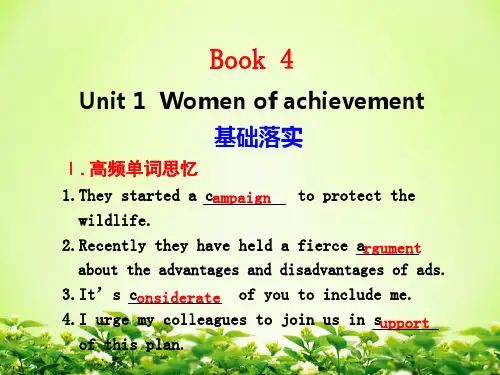
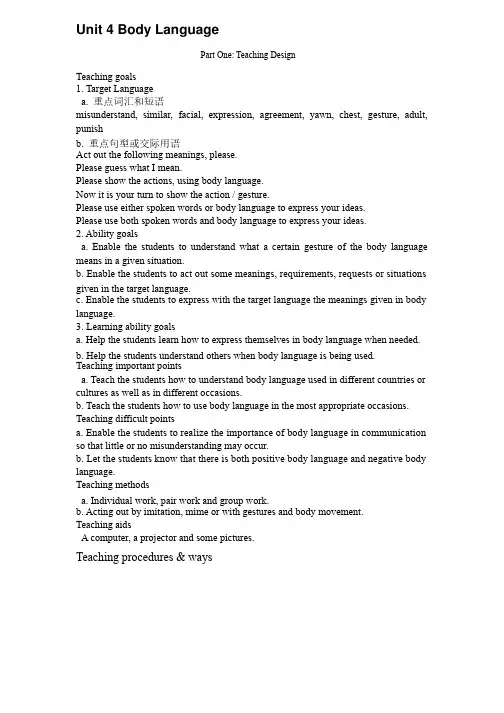
Unit 4 Body LanguagePart One: Teaching DesignTeaching goals1. Target Languagea. 重点词汇和短语重点词汇和短语misunderstand, similar, facial, expression, agreement, yawn, chest, gesture, adult, punishb. 重点句型或交际用语重点句型或交际用语Act out the following meanings, please.Please guess what I mean.Please show the actions, using body language.Now it is your turn to show the action / gesture.Please use either spoken words or body language to express your ideas.Please use both spoken words and body language to express your ideas.2. Ability goalsa. Enable the students to understand what a certain gesture of the body language means in a given situation.b. Enable the students to act out some meanings, requirements, requests or situations given in the target language.c. Enable the students to express with the target language the meanings given in body language.3. Learning ability goalsa. Help the students learn how to express themselves in body language when needed.b. Help the students understand others when body language is being used.Teaching important pointsa. Teach the students how to understand body language used in different countries or cultures as well as in different occasions.b. Teach the students how to use body language in the most appropriate occasions. Teaching difficult pointsa. Enable the students to realize the importance of body language in communication so that little or no misunderstanding may occur.b. Let the students know that there is both positive body language and negative body language.Teaching methodsa. Individual work, pair work and group work.b. Acting out by imitation, mime or with gestures and body movement.Teaching aidsA computer, a projector and some pictures.Teaching procedures & waysThe first period reading(COMMUNICATION: NO PROBLEM?)AimsTo help students develop their reading ability.To help students learn about body language.ProceduresI. Warming upWarming up by actingLook at the list of interpretation on the right side of the chart. Perform the action or the nonverbal behaviour on the left side.Examples Of Body LanguageWarming up by defining—What is body language?II. Pre-reading1. Looking and sayingLook at the man in the picture below. What does he say to you by his body language?Basically, how the ...... do I know? Or, I don’t know nothin! The shoulders are hunched and the hands are open signifying a big question mark.2. Talking and sharingBody language is the quiet, secret and most powerful language of all!According to experts, our non-verbal language communicates about 50% of what we really mean (voice tonality contributes 38%) while words themselves contribute a mere 7%.Our bodies send out messages constantly and often we don't recognize that we're communicating a lot more than we realize.Our understanding and use of non-verbal cues in facial expression are familiar to us nearly from birthIII. Reading1. Reading aloud to the recordingNow please listen and read aloud to the recording of the text COMMUNICATION: NO PROBLEM?. Pay attention to the pronunciation of each word and the pauses within each sentence. I will play the tape twice and you shall read aloud twice, too.2. Reading and underliningNext you are to read and underline all the useful expressions or collocations in the passage. Copy them to your notebook after class as homework.3. Reading to identify the topic sentence of each paragraphNext you are to skim the text to identify the topic sentence of each paragraph.4. Reading and transferring informationRead the text again to complete the table. Where is he/ she from? What does he/ she do when he/ she meet someone at the airport for the first time?Name Country Action MeaningMr GarciaJulia SmithAhmed AzizMadame Coulon5. Reading and understanding difficult sentencesAs you have read the text times, you can surely tell which sentences are difficult to understand. Now put your questions concerning the difficult points to me the teacher.6. Reading and translatingNow it’s time to translate the text into Chinese, sentence by sentence. Who will be the first to d o it?IV. Closing downClosing down by doing exercisesTo end the lesson you are to do the comprehending exercises No. 1 and 2 on page 26 and 27.Closing down by checkingC heck some of the following basic non-verbal cues and you'll recognize that you already speak and translate much of the language.“I’m surprised!” I’m shocked!” “I’m sad!”The second period Learning about Language(The ~ing form as the Attribute & Adverbial)I. Warming upWarming up by discovering useful words and expressionsTurn to page 27 and do exercises No. 1, 2 ,3 and 4 first. Check your answers against your classmates’.II. Learning about grammar1. Reading and thinkingTurn to page 25 and read with me the text of COMMUNICATION: NO PROBLEM? As you read along, pay attention to the uses of The ~ing form as the Attribute & Adverbial. (They are visitors coming from several countries. 作定语;Four people enter looking around in a curious way. 作状语;作状语; This is an exciting experience for you. 作定语; You stand watching and listening. 作状语;……)2. Doing exercises No. 1 and 2 on page 29Turn to page 29. Do exercises No. 1 and 2。
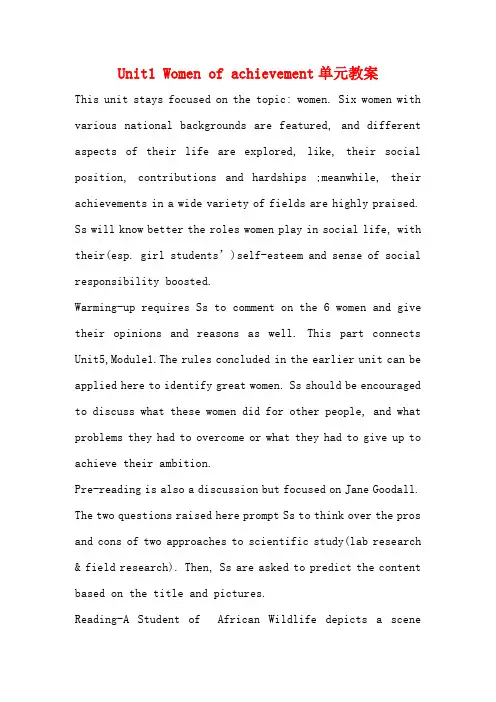
Unit1 Women of achievement单元教案This unit stays focused on the topic: women. Six women with various national backgrounds are featured, and different aspects of their life are explored, like, their social position, contributions and hardships ;meanwhile, their achievements in a wide variety of fields are highly praised. Ss will know better the roles women play in social life, with their(esp. girl students’)self-esteem and sense of social responsibility boosted.Warming-up requires Ss to comment on the 6 women and give their opinions and reasons as well. This part connects Unit5,Module1.The rules concluded in the earlier unit can be applied here to identify great women. Ss should be encouraged to discuss what these women did for other people, and what problems they had to overcome or what they had to give up to achieve their ambition.Pre-reading is also a discussion but focused on Jane Goodall. The two questions raised here prompt Ss to think over the pros and cons of two approaches to scientific study(lab research & field research). Then, Ss are asked to predict the content based on the title and pictures.Reading-A Student of African Wildlife depicts a scenewhere Jane and her colleagues studied chimps in an African forest and explains the significance of their work and the achievements she reached. Despite the fact that it was a dirty and tiring job to do the field research in the wild, they all regarded it as worthwhile. Some of their valuable discoveries would not have been made in the lab;for the very reason Jane Goodall had chosen the primitive African forest to study in.Her years of observing and recording chimps’ daily activities attributed to a better understanding of their behaviour. She has argued that wild animals be left in the wild and not used for entertainment or advertisements. She has endeavored to enhance people’s awareness of understanding, respecting and protecting wild animals. She is an inspiring role model !Comprehending consists of 4 Exx, guiding Ss to comprehend the reading passage at different levels. Exx1-3 are intended to aid Ss to obtain important details ,grasp paragraph main ideas and transfer text information in the form of multiple choice, summing-up and filling in a chart. The 4 open-ended Qs in Ex4 encourage Ss to think in oth ers’ shoes, which helps strengt hen Ss’ faith in animals protection.Learning about Language is to discover and practice usefulwords, expressions and structures. Discovering useful words and expressions is meant to help Ss to further study word formation, key words & phrases; Discovering useful structures centers on “subject-verb agreement”, determining the number of collective noun being the priority for the moment. Form-Meaning-Use approach is encouraged in grammar study.Using language is to train Ss’ in tegrating skills in listening, speaking , reading and writing. Reading features Lin Qiaozhi,a famed specialist in women disease, who achieved great success in her career with remarkable perseverance and efforts. She cared about women and mothers, esp. those living in poverty, and earned respect with her kindness and warn heart. Plus, she dedicated all her life to her patients and Chinese medical care. Ss are expected to learn about an outstanding woman’s life, and, more importantly, get enlightened when considering their future career choice. (Listening, Speaking & writing : omitted)Summing Up,Learning Tip,Reading for Fun: omittedKey points covered in this unit are summarized as follows;⑴ know about great women of achievement in various fields and discuss their qualities;(2) learn how to describe a person with adjectives about people’s qualit ies and personalities;(3) well identify the number of collective noun and master the corresponding principle of keeping verb-form in agreement with the subject;(4) master how to change nouns into verbs, vice versa; Further study word formation;(5) master the following words, expressions and their usage in concrete context:(pls refer to TB4 p.1)_________________________________________________________ ___________________Period One Warming up (p.1); Using language: Listening (p.7)☆ Teaching objectives1. abilitySs will be able to learn about and briefly talk about the 6 women’s life, main deeds and contributions in Warming up; Ss will be able to develop the abilities of pre-listening predicting &listening for key words while listening .2. language knowledge & skillsAfter this period of learning Ss will be able to:Understand the meaning of the following words & phrases and master their basic usage:achievement, welfare project, institute, specialist, connection, human beings, campaign, organization, dress as, help do sth, concern oneself with sth, devote one’s life to sth, found a campaign to do sthLearn how to use the following key sentence patterns: Joan of Arc was a girl from the countryside who dressed as a man and went to fight for the French.She helped drive the English out of France.She helped improve prison conditions and gave prisoners work and education.She concerned herself with welfare projects, especially the China Welfare Institute for women and children.She devoted all her life to medical work for Chinese women and children.Her research showed the connections between chimps and human beings.Jody Williams helped found an international campaign to stop the making of landmines.3. cultural consciousnessSs will be able to know about the unfairness women meet within society and take a right attitude towards gender difference☆ Teaching procedures & waysⅠ:Warming up1. What did Joan of Arc ,Elizabeth Fry, Song Qingling, Lin Qiaozhi, Jane Goodall and Jody Williams do respectively?dress as / fight for / drive sb out of …\\help improve …\\concern oneself with …\\devote one’s life to …\\show the connections between …\\found a campaign to …2. Scan the passages and fill in the tableⅡ :Discussion1. What do these six women have in common?devoted, determined, committed, inspiring, influential, had careers2. Do you still remember Nelson Mandela? What do you think makes a great man or womanⅢ:Listening1. Discuss in groups.Is it easy for women to succeed?What difficulties might women meet? Do you think men have the same problems? Give reasons.2.Listen for the first time and check the ideas that you have just discussed before3. Listen to the tape again and take notes on the three problems given in the listening.-Ex24. Listen once more and fill in the blanks-Ex3Ⅳ: DiscussionIt is said that “it is more difficult for a woman to be succe ssful”. Do you agree or disagree? State your reasons.Ⅴ: Summary and homework1. Remember the following words and expressions.achievement, welfare project, institute, specialist, connection,human beings, campaign, organization, found a campaign dress as / fight for / help drive sb out of some place /help improve / concern oneself with / devote one’s life to /show the connections between …2. Preview the reading “A student of African wildlife”. Study the new words and finish Eexercise 1 on page4 ☆ Reflection:_________________________________________________________________________________________________________________________________________________________________________________________________________________________________________________________________________________________________________________________________________________________________________________________________________________________________________________________________________________________________________________________________________________________________________Period Two Pre-reading (p.1); Reading; Comprehending (pp.2-3)☆ Teaching objectives:1.abilityFurther train Ss to predict the content based on the title and pictures;develo p Ss’ reading skills of grasping the gist, summing up Para. main ideas, obtaining key information, raising Qs (general,detailed,inferring,writing skills) ,and retelling the text with some questions and words as a support; Develop Ss’ ability to acquire inf ormation through reading; summarize the methods of observing chimps and Jane Goodall’s achievements in chimp study and protection.2. language knowledge & skillsAfter this period of learning,Ss will be able to master the following language items in the specific context of the passage-“A Student Of African Wildlife” After this period of learning,Ss will be able to useKey words & phrases:behave, behaviour, shade, worthwhile, nest, bond, observe, childhood, respect, argue, entertainment, inspiremove off, be outspoken about, lead a busy life, crowd in Key structures:Watching a family of chimps wake up is our first activity of the day.Everybody sits and waits in the shade of the trees while the family begins to wake up and move off.Jane warns us that our group is going to be very tired and dirty by the afternoon and she is right.Her work changed the way people think about chimps.3. Affect & attitudeGuide Ss to appreciate the heroine’s spirit of braving hardships.☆ Teaching procedures & ways:I. Pre-reading1. Retell the story about Jane Goodall.study chimps in Africa, show the connections between chimps & human beings, protect chimps2. Discuss in groups.Why do you think Jane Goodall went to Africa to study chimps rather than to university?Do you think she was right? Give your reasons.Can you think of the possible difficulties that Jane Goodall might meet doing her research without training?3. PredictionLook at the title and the pictures. Then answer the following questions.1) What do you think the passage will tell us?2) What is Jane Goodall doing in the picture on the top right?3) What is Jane Goodall doing in the picture on the bottom left?4. Vocabulary matching._____ close connection that people have with each other _____ to fill sb with feelings or aims_____ (of thoughts, questions, etc) to fill one’s mind _____ the period of time when someone is a child_____ giving opinions openly and honestly_____ to move away from a place; to leave_____ task that requires a lot of time and effort_____ to watch carefullyII. Reading1. Fast readingSkim the passage and underline the basic information: what, who, why, where, when, how.2. Underline the topic sentence in each paragraph. Following Jane’s way of studying chimps, our group are all going to visit them in the forest.Nobody before Jane fully understood chimp behaviour.For forty years Jane Goodall has been outspoken about making the rest of the world understand and respect the life of these animals.She has achieved everything she wanted to do.Ssummarize the main idea of each paragraph-Ex2 p.3 Discover the structure of the text.5. Ask questions.Make up questions within your group based on the reading. Each group chooses a best question and the other groups compete to answer it.E.g. what’s the main idea of the first paragraph? (General) When did Jane first arrive in Gombe? (detailed)What do we know about Jane’s personality from the second paragraph? (make an inference)Which part is the summary of the reading? (writing skills)…6. Answer more questions from the T.In which way has Jane helped people? (behave)What did we do before we followed the chimps wandering into the forest? (shade, move off)What did the writer think of the evening? (worthwhile) What did the writer realize after a day’s watching? (bond) How did Jane discover the society of chimps? (observe ) How did Jane try to protect the lives of chimps in their natural habitat? (be outspoken about, respect, argue) When did Jane want to work with animals in their own environment? (childhood)What about Jane’s life now? (lead a busy/meaningful life) Activity III. Post-reading1. In your group rretell the text using the following questions and words as a support.What did the writer do? (behave, shade, worthwhile, bond) What did Jane Goodall do and find out about chimps? (observe, discover)What did Jane Goodall do to protect the chimps? (be outspokenabout, respect, argue)What about her achievements?2. Discuss in groups.Reconsider the title. Do you understand it differently? Discuss with your partners.Do you think it is more important to study chimps in the wild rather than in a zoo? Givereasons.Do you think you would go if you are asked to study animals in the wild? Why or why not?IV. Summary and homeworkRemember the following words and expressions.behave, shade, move off, worthwhile, nest, bond, behaviour, observe, childhood, be outspoken about, respect, argue, entertainment, lead a busy life, crowd in, inspire2. Finish Exercises 1 and 3 ( p. 3) and Exercise 3 (p. 4).☆ Reflection:_________________________________________________________ _________________________________________________________ _________________________________________________________ _________________________________________________________ __________________________________________________________________________________________________________________ _________________________________________________________ _________________________________________________________ _________________________________________________________ ________________________________________Period Three Using language: Reading (p.6), Speaking (p.7)☆ Teaching objectives1. abilityAfter this period of learning,Ss will be able toobtain important information by means of reading and sum up the heroine’s qualities;describe a person’s quality and personality.2.language knowledge & skillsAfter this period of learning,Ss will be able to use the following language items:key words & phrasessickness, intend, emergency, generation, kindness, consideration, deliverdo research on, by chance, come across, cut the death rate, carry onkey sentence patternsBy chance I came across an article about a doctor called LinQiaozhi, a specialist in women’s diseases.Who were the women that Lin Qiaozhi thought needed this advice?Further reading made me realize that it was hard work and determination as well as her gentle nature that got her into medical school.Teaching procedures & waysI. Review1. Review Jane Goodall’s story. Use as many new words from the passage as possible.behave, behaviour, shade, worthwhile, nest, bond, observe, childhood, respect, argue, entertainment, inspiremove off, be outspoken about, lead a busy life, crowd in 2. Check the homework. Share your mother or grandmother’s experiences with your group.Now Let’s look at the career of somebody who lived at the same time as your grandmother.II. Pre-reading1.What do you know about Lin Qiaozhi? (a doctor, a specialist in women’s diseases …)2.Which adjectives could you use to describe her?(devoting, kind, inspiring, respected, clever, …)III. Reading1. Read for the first time. List three of Lin Qiaozhi’s achievements.—Ex 1 p.62. Find the words or phrases in the text to replace the underlined parts.I went to all the bookstores of the town to buy the book, but failed. Today, I found it by chance in my friend’s house. (came across)Last night the heavy rain destroyed the country road and the only doctor in the village had to help a woman to give birth to a baby. (deliver a baby)After my partner left I tried to continue our work as usual. (carry on)The book is designed for children. (is intended for)3. Read again and answer the following questions by using sentences from the passage.When did the writer decide to study at a medical college? (do research on) How did the writer find the article about Lin Qiaozhi? (by chance, come across)For whom and for what purpose did Lin Qiaozhi write a small book about how to look after babies? (cut the death rate, beintended for)Why was it difficult for Lin Qiaozhi to get medical training? (generation, be placed second to)What helped Lin Qiaozhi succeed later on? (kindness and consideration)Why do you think the writer chose to study at medical college? (carry on )IV. Post-reading1.Work in groups to discuss what are the important qualitiesa good doctor should have.Ex2Q4 p.62. What do you think of Lin Qiaozhi? Work in groups to thinkout the adjectives which can describe one’s quality.hard-working energetic active determined intelligentfair generous kindhelpful confident brave honest unselfish devoted educated warm-hearted modest considerate strong-minded self-reliant self-respected responsible3. Group work. Use the adjectives to talk about the great person you admire. Follow the givenoutline.Outline:1) Topic sentence2) Supporting sentences3) ExamplesV. Summary and homework1. Remember the following words and expressions.do research on, by chance, come across, cut the death rate, intend, emergency, generation, kindness, consideration, deliver, carry on2. Write a composition about the person you admire based on your classroom talk.Reflection:_________________________________________________________ _________________________________________________________ _________________________________________________________ _________________________________________________________ _________________________________________________________ _________________________________________________________ _________________________________________________________ _________________________________________________________ ___________________________Period Four Learning about language: Discovering useful words and expressions (p.4); Using words and expressions (p.42)☆ Teaching objectives1. Master the common suffixes transforming verbs into nouns: -ment, -ation, -ion, -ist, -er, -or, -ant, -ee, -ance, -ure2. Study and master the key words & phrases in this unit. Teaching procedures & waysI. Homework checkingShare your writing with our group. Check with each other. II. Word formation1.Fill in the chart with a suitable verb or noun form. Pay attention to the connectionbetween them. (p.4 Ex. 2)2. Work in groups to discuss how verbs can be changed into nouns-ment -ation -ion -ist agree--- move---appreciate--- examine---admit--- educate---tour--- type---3. Can you summarize other suffixes? Give examples if you can. -er -or -ant -ance -ee -urework--- drive--- advise--- act--- conduct--- sail---attend---admit--- attend--- guide---employ--- train---depart --- press--- fail---III. VocabularyWork in groups and study the words and expressions. Try tosummarize the usages. Then make sentences by yourselves.1. achieve sth (success, goal, aim, purpose, etc)1) He achieved his ambition of making a robot.2) Because he was hard-working, he achieved fullmarks in the exam.n. achievement1) The achievement as a teacher is to show his students howto learn.2) A sense of achievement will encourage students to makemore efforts.2.campaign3.dress4. put… to death5.deliver6.behave7.argue8.worthwhile9.observe10.lead a… life11.crowd in12.look down upon13.intend14.carry onIV. PractiseComplete the sentences with the words in their proper forms.1) A sense of_______ (achieve) is very important for a student.2) It is strange that the old lady is_______ (dress) in red.3) His life _________ (devote) to helping the poor.4) It is worthwhile_______(walk) to work every day.5) The school being built is_________(intend) for the homeless children.2. Complete the passage-Ex2 p42V. Summary and homework1. Summarize noun suffixes.2. Finish Exercises 1 and 3 on page 42.☆ Reflection:_________________________________________________________ _________________________________________________________ _________________________________________________________ _________________________________________________________ _________________________________________________________ _________________________________________________________ _________________________________________________________ _______________Period Five Learning about language: Discovering useful structures (p.5);Using structures (p.43)☆ Teaching objectives1. Master the principles of subject-verb agreement when collective nouns,pronuns,nouns or/and pronuns connected by connectors;2. apply the language knowledge about subject-verb agreement to practice.Teaching procedures & waysI. Review-the definition of subject-verb agreementChoose the correct verb form. Can you summarize the rules?I am/are seventeen. // She is/are sixteen.There is/are a desk in the room.· There is/are no chairs in it.John gets/get up at six o’clock every morning.They has/have not come yet.What is/are the latest news about the Olympics?II. Collective nouns1.Study the examples in Ex1 p.5 and2. More examples inEx2 p.53. Guide Ss to summarize the ruleIII. Pronouns1. Look at the following sentences. Note the subjects and verbs2.T’s guidance3. Practise-Ex2 p.43IV. Other examples1.Study the following sentences,payingattention to the subj-v agreement就近一致Practice-Ex3 p.5V. Summary of subject-verb agreement rules :Read through the Grammar summary on pages 88-89.VI. HomeworkFinish Exercise 2 on page 5 and Exercises 1 and 3 on page 43 Reflection_________________________________________________________ _________________________________________________________ _________________________________________________________ _________________________________________________________ _________________________________________________________ _________________________________________________________ _________________________________________________________ _________________________________________________________ ___________________________Period Six Listening and talking (p.41); Listening task (p.44); Reading task (p.44)☆ Teaching objectivesAfter this period of learning, Ss will be able to:1. predict the listening content based on the picture and already-known information ; take notes of key points while listening;2. ⑴adeptly describe a person with adjectives & describe differences between persons;(2)maintain a talk by resorting to communicative strategies, like, asking & clarifying Qs3. while reading,grasp key information & take special note of connecting words.Teaching procedures & waysI. Listening1. Look at the picture on page 41 and read through Exx 2 & 3. What can you predict about the listening?2. listen to Part 1 and finish Ex2 p.413. Listen to Part 2 and finish Ex 3. p.41II. TalkingWhich Chinese woman in the past also disguised herself as a man to join the army?2. Compare Joan of Arc and Mulan3. Read the questions in pairs. You can make up more questions.Why do you admire her?What did she do to impress you most?How would you describe her?Why did she choose to join the army?Was she successful? What happened to her later?Can you give an example to show …?4. Make up a short dialogue in pairsS1: Do you think that Joan of Arc was like Mulan?S2: Well, I suppose she was in some ways. They were both brave, weren’t they?S1: Yes, but I admire Mulan more.S2: What did she do to impress you?S1: …III. Listening Task p441. Before Listening. T: We are going to listen to a dialogue between Ding Lingyu and Ms Jody Williams about the latter’s work to ban landmines.1)What does ICBL mean?2)Why are landmines dangerous? What can landmines do to people?2. Listen to Part 1 carefully and take notes. Fill in the chart in Ex2 p443. Listen to Part 2 and fill in the blanks. Ex3 p44IV. Reading Task p441. What do you know about Elizabeth Fry from Warming-up?A Quaker // Helped improve prison conditions and gave prisoners work and education //Helped the Quakers get the Nobel Peace Prize in 19472. Skim the reading about Elizabeth in five minutes and finish Ex 1. p44V. Homework1. Remember all the new words and phrases in Unit 1.2. Finish Exercise 2 on page 45.3. Think about a special woman you admire and look for some information about her.Reflection:_________________________________________________________ _________________________________________________________ _________________________________________________________ _________________________________________________________ _________________________________________________________ _________________________________________________________ _________________________________________________________ _________________________________________________________ ___________________________Period Seven Using language: Writing (p.7), Summing up (p.7)☆ Teaching objectivesAfter this period of learning, Ss will be able to:1. write about a person’s life and work , using basic writing skills&strategies properly2.sum up what has been covered in Unit 1Teaching procedures & ways.I. Lead inReview the three passages we have read.Think about:what we can write when introducing a person; how we shall organize an article about a person.2. Talk about a great woman you admire.II. Summary1. Possible content:1)personal information2)personality and quality3)things she/he has done4)evaluation from other people2. Possible ways to write the article:Part 1: an introduction of the personPart 2: supporting details1) characters2) achievementsPart 3: a conclusion1) what you think of him/her2) how people view him or her3. Description and evaluation vocabulary4. Writing TipWhen you are writing about somebody’s life, choose an interesting example that shows the person’s character.(p. 8)5. Sayings & proverbs : Reading for fun (p.8)You have to believe in yourself. That’s the secret of success. (Charles Chaplin)人必须相信自己,这就是成功的秘诀。
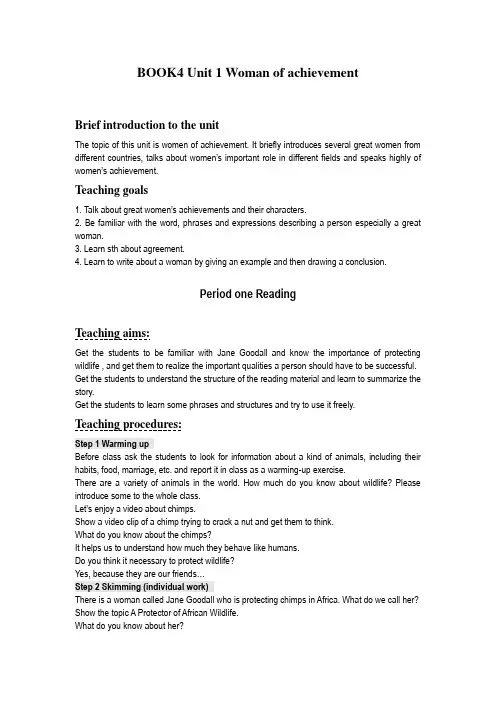
BOOK4 Unit 1 Woman of achievementBrief introduction to the unitThe topic of this unit is women of achievement. It briefly introduces several great women from different countries, talks about women’s important role in different fields and speaks highly o f women’s achievement.Teaching goals1. Talk about great women’s achievements and their characters.2. Be familiar with the word, phrases and expressions describing a person especially a great woman.3. Learn sth about agreement.4. Learn to write about a woman by giving an example and then drawing a conclusion.Period one ReadingTeaching aims:Get the students to be familiar with Jane Goodall and know the importance of protecting wildlife , and get them to realize the important qualities a person should have to be successful. Get the students to understand the structure of the reading material and learn to summarize the story.Get the students to learn some phrases and structures and try to use it freely.Teaching procedures:Step 1 Warming upBefore class ask the students to look for information about a kind of animals, including their habits, food, marriage, etc. and report it in class as a warming-up exercise.There are a variety of animals in the world. How much do you know about wildlife? Please introduce some to the whole class.Let’s enjoy a video about chimps.Show a video clip of a chimp trying to crack a nut and get them to think.What do you know about the chimps?It helps us to understand how much they behave like humans.Do you think it necessary to protect wildlife?Yes, because they are our friends…Step 2 Skimming (individual work)There is a woman called Jane Goodall who is protecting chimps in Africa. What do we call her? Show the topic A Protector of African Wildlife.What do you know about her?Jane Goodall博士于2002年4月16日被任命为联合国和平使者。
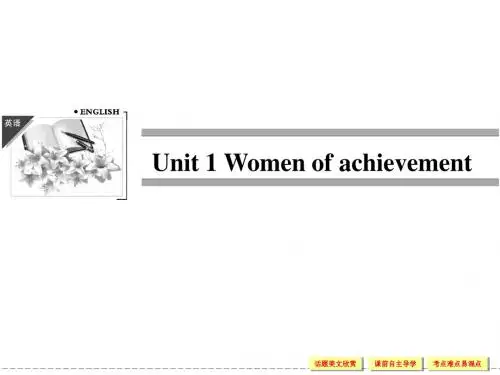
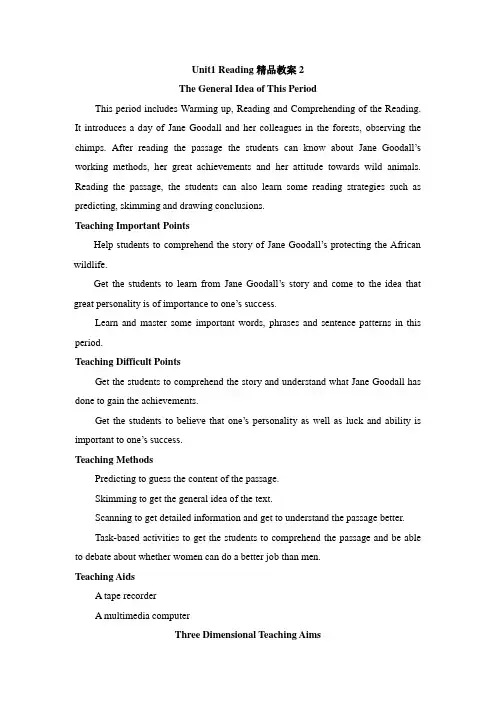
Unit1 Reading精品教案2The General Idea of This PeriodThis period includes Warming up, Reading and Comprehending of the Reading. It introduces a day of Jane Goodall and her colleagues in the forests, observing the chimps. After reading the passage the student s can know about Jane Goodall’s working methods, her great achievements and her attitude towards wild animals. Reading the passage, the students can also learn some reading strategies such aspredicting, skimming and drawing conclusions.Teaching Important PointsHelp students to comprehend the story of Jane Goodall’s protecting the African wildlife.Get the students to learn from Jane Goodall’s story and come to the idea that great personality is of importance to one’s success.Learn and master some important words, phrases and sentence patterns in this period.Teaching Difficult PointsGet the students to comprehend the story and understand what Jane Goodall has done to gain the achievements.Get the students to believe that one’s personality as well as luck and ability is important to one’s success.Teaching MethodsPredicting to guess the content of the passage.Skimming to get the general idea of the text.Scanning to get detailed information and get to understand the passage better.Task-based activities to get the students to comprehend the passage and be able to debate about whether women can do a better job than men.Teaching AidsA tape recorderA multimedia computerThree Dimensional Teaching AimsKnowledge and SkillsEnable the students to comprehend the story of Jane Goodall’s protecting theAfrican wildlife.Enable the students to learn from Jane Goodall to treat animals in a human way and come to the idea that great personality is of importance to one’s success.Learn some useful words and expressions: achieve, achievement, condition, welfare, connection, behave, behavior, worthwhile, specialist, observe, observation argue, inspire, support, devote ... to, etc.Learn some sentence patterns:Watching a family wake up is our first activity of the day.Only after her mother came to help her for the first months was she allowed tobegin her project.Process and StrategiesGroup work to encourage the students to participate in class activities.Fast reading to make the students get the main idea of the passage.Feelings and ValueFor forty years Jane Goodall has been helping the rest of the world understand and respect the life of these animals. People will do something that can satisfy theirfeelings and make a better world.Teaching ProceduresStep 1 Lead-in1. Greet the students.T: Good morning/ afternoon, boys and girls!Ss: Good morning/ afternoon, Miss. /Mr...2. Introduce the topic of great women.1) Show some pictures of women for the students to guess who they are and tellwhether they are great women or not.T: Do you have idols? Now I would like to show you some pictures of women to seewhether they are your idols and try to tell me whether they are great women.。
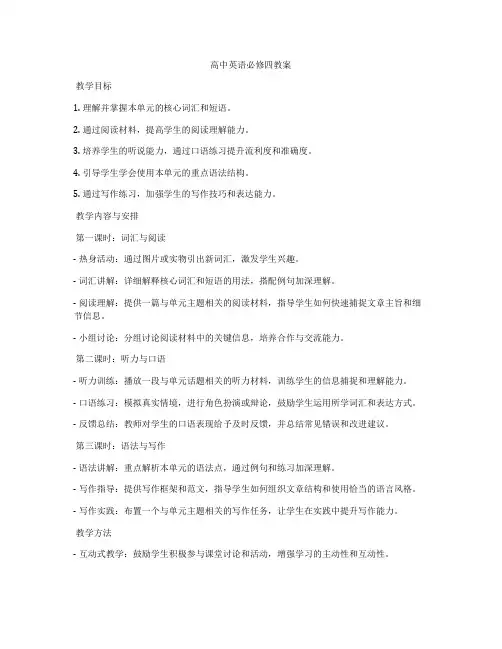
高中英语必修四教案教学目标1. 理解并掌握本单元的核心词汇和短语。
2. 通过阅读材料,提高学生的阅读理解能力。
3. 培养学生的听说能力,通过口语练习提升流利度和准确度。
4. 引导学生学会使用本单元的重点语法结构。
5. 通过写作练习,加强学生的写作技巧和表达能力。
教学内容与安排第一课时:词汇与阅读- 热身活动:通过图片或实物引出新词汇,激发学生兴趣。
- 词汇讲解:详细解释核心词汇和短语的用法,搭配例句加深理解。
- 阅读理解:提供一篇与单元主题相关的阅读材料,指导学生如何快速捕捉文章主旨和细节信息。
- 小组讨论:分组讨论阅读材料中的关键信息,培养合作与交流能力。
第二课时:听力与口语- 听力训练:播放一段与单元话题相关的听力材料,训练学生的信息捕捉和理解能力。
- 口语练习:模拟真实情境,进行角色扮演或辩论,鼓励学生运用所学词汇和表达方式。
- 反馈总结:教师对学生的口语表现给予及时反馈,并总结常见错误和改进建议。
第三课时:语法与写作- 语法讲解:重点解析本单元的语法点,通过例句和练习加深理解。
- 写作指导:提供写作框架和范文,指导学生如何组织文章结构和使用恰当的语言风格。
- 写作实践:布置一个与单元主题相关的写作任务,让学生在实践中提升写作能力。
教学方法- 互动式教学:鼓励学生积极参与课堂讨论和活动,增强学习的主动性和互动性。
- 分层次教学:根据学生的不同水平,提供相应的学习任务和挑战,确保每个学生都能得到适合自己的学习内容。
- 多媒体辅助:利用多媒体工具如T、视频等丰富教学手段,提高学生的学习兴趣。
评价方式- 形成性评价:通过课堂表现、作业完成情况和小组活动参与度等多维度进行评价。
- 总结性评价:通过单元测试或项目作业来检验学生对本单元知识的掌握程度。
教案小结。
Unit1 women of achievementtext.understand the passage better.Teaching Aids教具准备Introduce the topic of great women.(Give the students two minutes to discuss in pairs.)share the opinions with us?S:In my opinion , a great woman should be…Other students add their opinions.Step 2 prediction预测the main content of the passage.T:Who is the woman?Ss:Jane Goodall.T:What is the animal?Ss:It’s a chimp.T:What is she doing?Ss:She is kissing the chimp.about?worked with chimps in their environment T: Do you agree with her?Ss:Yes/ No.Book4 Unit1 Women of achievement Period 1ReadingTeaching goals 教学目标1. Target language 目标语言a. 重点词汇achievement, behave, shade, worthwhile, nest, observe, outspoken, respect, argue. b. 重点句子Watching a family of chimps wake up is our first activity of the day.2. Ability goals 能力目标a. know how to tell the great women.b. Learn the way to describe a person.3. Learning ability goals 学能目标Teach Ss how to describe a person.Teaching Important Points教学重点By reading A student of African wildlife, students can learn from Jane Goodall in at least two aspects: one is what is the humane way to study animals; the other is that it was her great personality - universal love and mercy(博爱与慈悲)that made her successful. If everyone had such kind of heart, they would give everything benefit for all living things. Then our world will be full of love and peace, without any war and starvation.Teaching Difficult Points教学难点Let everyone believe that all of us can become Jane Goodall to one’s success.Teaching Methods教学方法Predicting to guess the content of the passage.Skimming to get the general idea of the text.Scanning to get detailed information and get to understand the passage better.Task-based activities to get the students to comprehend the passage and learnsomething from Jane Goodall.Teaching Aids教具准备A multimedia computerTeaching Procedures教学过程与方式Step1 Lead-in 导入Introduce the topic of great women.1)Show some pictures of women for the students to guess who they are and tell whether they are great women or not.2) Get the students to have a discussion about the qualities needed to be a great womanT: Do you think they are great women?What they have in common?(Give the students two minutes to discuss in pairs.)T: Now what qualities do you think is needed in order to be a great woman? Who would like to share the opinions with us?S: In my opinion , a great woman sh ould be…Other students add their opinions.T:I agree with all of you. But in my opinion, most importantly a great woman should be unselfish and willing to sacrifice. Otherwise they will not overcome different difficulties and make great contributions to humans and our society. Do you think so? Step 2 prediction预测Get the Ss to read the title and pictures to predict the main content of the passage. T:Who is the woman?Ss:Jane Goodall.T:What is the animal?Ss:It’s a chimp.T:What is she doing?Ss:She is kissing the chimp.T:If you meet a chimp in the forest, will you do that like Jane Goodall?T:Now let’s have a look at the title—A student of African wildlife. what do you think the passage is about?S:I think the passage is about how Jane Goodle worked with chimps in their environmentT: Do you agree with her?Ss:Yes/ No.T:Let’s read and find out whether you are right or wrong.Step 3 Reading 阅读Task1–matchmatch the main idea with each paragraph after first readingTask2- finish the exercisesReading each paragraph carefullyand finish the exerciseson the blackboardTask3 - ComprehendingPage3 Ex.1task4–Listening and consolidation 巩固练习Jane Goodall has studied the _____ for many years in Africa and helped people_______ how much they ______ like human. Jane wanted to work with animals in their own _________. She spent many years _______ and ______ their daily activities. For 40 years, Jane has been________ about making the rest of the world understand and respect the life of these animals. She ______ those who want to _____ the achievements of women.Play the tape for the students and ask them to read the text after the tape in a low voice, paying attention to the pronunciation and intonation.Step4 group discussion 小组讨论How can you describe Jane Goodall?By using following questions1.What did Jane Goodall do for wild animals2. What qualities do you think Jane Goodall have?3. What should we learn from Jane Goodall?Homework1. Surf the Internet to find more information about great women.2. Write a short passages about the great women you choose ( about 100 words using the past tense form.)。
人教版高中必修四英语unit1全单元教案一、教学目标1. 知识目标:学生能够掌握本单元的重点词汇和短语,如achieve、behave、observe 等,并能正确运用。
学生能够理解课文内容,掌握重要的语法点,如主谓一致。
2. 技能目标:提高学生的阅读理解能力,能够快速准确地获取关键信息。
提升学生的写作能力,学会用英语描述人物事迹。
3. 情感目标:通过学习杰出女性的事迹,激发学生的学习动力和对成功的渴望,培养学生的坚韧不拔的品质和社会责任感。
二、教学重点与难点教学重点:1. 重点词汇和短语的掌握和运用。
2. 课文的理解和分析,培养学生的阅读技巧。
3. 语法点主谓一致的掌握。
教学难点:1. 如何让学生准确运用重点词汇和短语进行表达。
2. 理解课文中一些复杂句子的结构和含义。
3. 引导学生在写作中正确运用主谓一致。
例如,学生可能会在描述多个主语时出现主谓不一致的情况。
就像我之前教过的一个班级,有个学生总是搞不清楚主谓一致怎么用。
在做练习的时候,他写了一句话“The book and the pen is on the desk.”很明显这里应该是“are”而不是“is”。
这就体现了学生在学习主谓一致这个知识点时可能会遇到的困难。
而对于重点词汇和短语的掌握,我发现很多学生虽然记住了单词的意思,但在实际运用中却不知道该怎么用。
比如“achieve”这个词,学生可能只知道它有“实现”的意思,但不知道怎么在句子中正确使用它。
这就需要我们在教学过程中多举一些例子,让学生通过实际运用来掌握这些词汇和短语。
三、教学方法1. 情景教学法:通过创设与单元主题相关的情景,让学生身临其境,更好地理解和运用英语。
例如,在讲解课文中关于女性科学家的内容时,可以创设一个科学家研讨会的情景,让学生扮演科学家,进行交流和讨论。
2. 小组合作学习法:将学生分成小组,共同完成学习任务。
小组活动可以培养学生的合作能力和团队精神,同时也可以提高学生的学习积极性和参与度。
语言点参考教案一、日常口语突破描述他人与应答①—What does he look like? 他是个怎么样的人?—He is helpful and unselfish. 他乐于助人且大公无私。
②—How do her friends describe her? 她的朋友如何描述她?—She is considerate and energetic. 她考虑周到且精力充沛。
二、核心单词例析1. achieve vt.获得(成就等);达到(目的),完成(心愿)She achieved fame at the age of nineteen. 她十九岁时就成名了。
He’ll never achieve anything if he doesn’t work. 如果他不努力,就会一无所成。
I have achieved only half of what I’d hoped to do. 我只完成了我原想完成的一半。
They have achieved their goal. 他们已经达到了目的。
2. behave v.行为,举止;表现好,听话She behaves as if she were a man. 她的举止像个男人。
The boy behaved very well last night. 孩子昨天晚上表现挺好。
Tell him to behave, or I’ll fix him. 告诉他规矩点,否则我要收拾他。
Please behave yourself. 请礼貌点儿。
搭配:well-behaved children有礼貌的孩子;ill/`badly-behaved people不礼貌的人3. worthwhile adj.值得的,值得干的,值得花时间/金钱/精力的(1)可作定语、表语和宾语补足语。
如:Nursing is a very worthwhile career. 护理是很值得干的职业。
(定语)The visit to Paris is worthwhile. 去巴黎访问是值得的。
(表语)I think it worthwhile to read the book. 我认为看那本书是值得的。
(宾补)(2)用于It is worthwhile doing /to do sth. 句型。
如:It is worthwhile reading /to read the book. = Reading /To read the book is worthwhile. 这本书值得看。
比较:The book is worth reading. =The book is worthy of being read. = The book is worthy to be read. 这本书值得看。
This is a book worth reading. =This is a book worthy of being read. = This is a book worthy to be read.这是一本值得读的书。
4. observe vt. 遵守,说,观察,观测,We must observe the rules of the road. 我们必须遵守交通规则。
He observed (to me) that he did not feel well. 他(对我)说他觉得不太舒服。
I observed them entering /enter the bank. 我看到他们进了银行。
5. respect vt.尊重(人、意见等),敬佩,遵守(法律等)We should learn to respect others. 我们要学会尊重别人。
You ought to respect his opinions. 你应当尊重他的意见。
I respect his courage. =I respect him for his courage. 我敬佩他的勇气。
We must respect the laws of a country we are in. 我们必须遵守所在国家的法律。
6. inspire vt. 鼓舞,使产生,启发(1)鼓励,激励(=encourage)[可接sb. to (do) sth ]His words inspired all of us. 他说的话使我们都受到鼓舞。
He inspired me to work hard. 他鼓励我努力学习。
He inspired me to greater efforts. 他鼓励我加倍努力。
(2)注入,激起,使产生[后接sth. in /into sb.或sb. with sth.]He inspires self-confidence in /into his students. 他使学生产生了自信。
He inspires his students with self-confidence.(3) 启发,促成We should inspire the children to think. 我们要启发儿童思考。
His wife inspired his first novel. 他妻子让他有了写第一部小说的灵感。
7. support vt.支持,鼓励;支撑,承受;供养;证实He refused to support us. 他拒不支持我们。
He has a large family to support. 他要抚养一大家人。
These posts support the roof. 这些柱子支撑着房顶。
Can you give some examples to support your argument? 你能举几个例子来证实你的论点吗?8. strike vi. & vt.突然想到,给人以某种印象,打动If a better idea strikes you, let me know. 如果你想到更好的办法,就告诉我。
It strikes me (=I think) that we should stay here for the night. 我想我们应在这里过夜。
How does the film strike you? (= What do you think of the film?)你觉得这个计划怎么样?I was struck by her beauty? 我被她的美貌所打动。
此外,请体会strike在下列句中的意义与用法:The stone stuck him in the eye. 石头打中了他的眼睛。
Strike while the iron is hot. 趁热打铁。
The clock has struck (three). 钟刚敲过(三点)。
The ship struck a rock. 船触礁了。
He stuck a light /match. 他划燃一根火柴。
The miners struck for better working conditions. 矿工为争取改善工作条件而罢工。
We must prevent the disease striking again. 我们要防止这种疾病再次发生。
9. explain vt.解释,说明Can you explain why you were late? 你能解释一下你为什么迟到吗?The lawyer explained the new law to us. 律师向我们解释了新法律。
搭配:explain sth. to sb.向某人解释某事。
10. deliver vt. 接生,生,递送(信件等),发表(演说等)The doctor delivered her baby. 医生为她接生。
She was delivered of a healthy boy. 她生了一个健康的男孩。
We deliver newspapers. 我们每天送报上门。
He delivered a speech. 他发表了演说。
He delivered himself of his opinion. 他发表了自己的意见。
三、关键短语精讲1. concern oneself with /about关心,忙于She concerned herself with welfare projects…她关心福利事业……She should concern herself with your health. 她应关心你的身体。
联想:be concerned with /about关心,担心;与……有关He’s much concerned about your studies. 他非常关心你的学习。
I was very concerned about my mother’s illness. 我十分担心母亲的病情。
Who else are concerned with that matter? 还有谁与这件事有关?2. devote…to…把……奉献给……devote的宾语一般是时间、金钱、精力、生命等;to是介词,后接名词、代词或动名词,不能接不定式。
如:She devoted all her life to medical work for Chinese women and children. 她把毕生奉献给了中国妇女儿童工作。
He devoted all his free time to playing the piano. 他把所有业余时间都用来弹钢琴。
She devoted herself to helping the poor. 她献身于帮助穷人。
注:devote是及物动词,若无宾语,必然是:be devoted to (致力于,专心于,深爱,忠诚于)He used to be devoted to her. 他过去是很爱她的。
He is very devoted to his wife. 他非常忠于他的妻子。
He was devoted to Pure Science. 他专心致志于纯科学。
真题:Her son, to whom she was so ______, went abroad ten years ago. (上海)A. lovedB. caredC. devotedD. affected解析:选C。
句意是“她深爱的儿子10年前出国了。
”3. argue for据理主张,赞成,为……辩护The lawyer argues for the poor man. 律师为这可怜的人辩护。
He argued for the plan. 他赞成/反对这个计划。